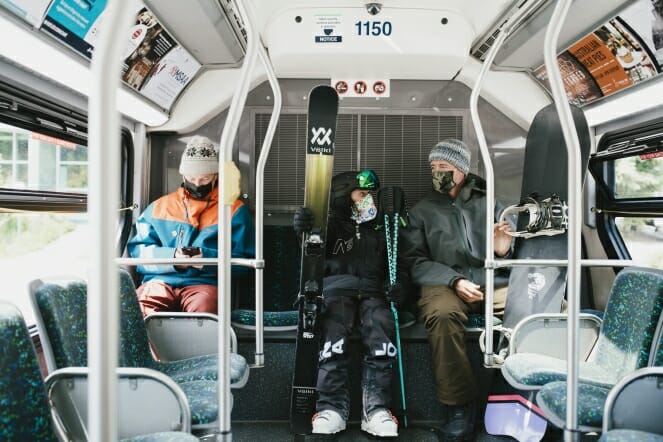Bylaw amendment aims to reduce greenhouse gas emissions and improve affordable transportation
The Resort Municipality of Whistler (RMOW) has implemented a new approach to parking requirements needed to upgrade the Fitzsimmons Express chairlift at the base of Whistler Mountain. The approach includes conditions to seek funding for sustainable transportation initiatives and secure much-needed detailed data on parking usage.
On Monday, RMOW Council gave fourth and final reading to a bylaw amendment, which forgoes existing parking requirements for additional parking stalls in favour of a community contribution reflective of today’s cost of living pressures and climate reality, as part of the permitting process for Whistler Blackcomb’s upgrade to the Fitzsimmons Express lift.
The amendment specifies that to the extent that Whistler Blackcomb and the Province elect to implement paid parking, the RMOW will share in ongoing revenues and will apply these funds to transit and improving active transportation alternatives. Whistler Blackcomb will also fund a parking and transportation utilization study to inform decisions related to reducing congestion, traffic and parking patterns, environmental impact and alternative transportation. And finally, the resort will also provide $200,000 in annual transit contributions to fund pressing needs within the Whistler Transit Future Action Plan.
“Whistler has a complicated set of challenges to take on. We need to ensure the economic success generated in Whistler finds its way into the pockets and lives of Whistlerites. This amendment strikes the right balance between the mountain operations and their impact on community infrastructure. Whistler is missing our climate targets and every decision we make must consider how to shape our community to reduce our greenhouse gas emissions and make sustainable, affordable transportation the logical choice,” says Mayor Jack Crompton.
Whistler’s Big Moves climate action goals target a reduction of Greenhouse Gas (GHG) emissions to 2007 levels by 2030; however, traffic congestion has increased in Whistler over the COVID-19 period, resulting in increased GHG emissions. The largest source of emissions remains personal vehicles.
“By taking a measured and staged approach to understanding our parking usage and needs, engaging Whistlerites to hear their thoughts on parking strategy and ensuring the community receives ongoing substantial contributions toward our transit systems and active transportation, we will have the kind of pivotal impact needed to achieve our Climate Action targets,” says Crompton. “Adding more parking would add more congestion and emissions, putting Whistler’s 2030 climate action target further out of reach.”
“We are excited to upgrade the Fitzsimmons Express lift this summer and appreciate the partnership of the RMOW, Province, Lil’wat Nation, and Squamish Nation, as we work together towards our shared goals,” said Doug Pierini, Interim COO – Whistler Blackcomb. “Climate action is a priority we must all collectively address, and is something we are deeply focused on both at our resort and as a company, with our Commitment to Zero 2030 goals to positively impact our communities, industry, and world. We remain committed to ongoing collaboration in service of both the town and resort as world-class destinations and are focused on addressing the needs of the community, especially related to parking/transportation and positively impacting the environment.”
“The investment of this lift on public land by Whistler Blackcomb is significant and supports the visitor experience while helping the resort to balance capacity, which is a key element of provincial ski area planning,” said Lana Popham, Minister of Tourism, Arts, Culture and Sport. “This upcoming work, aligned with the approved Master Plans and Master Development Agreements for Whistler Blackcomb, will ensure the sustainability of the resort and community and support collaboration between all parties, while demonstrating how resorts reduce impacts on the climate and engage in sustainable tourism.”

